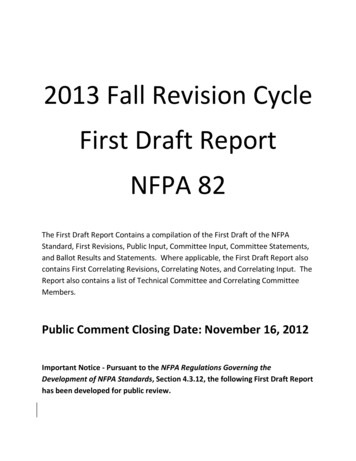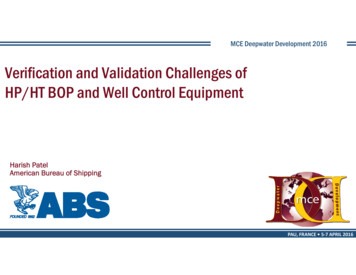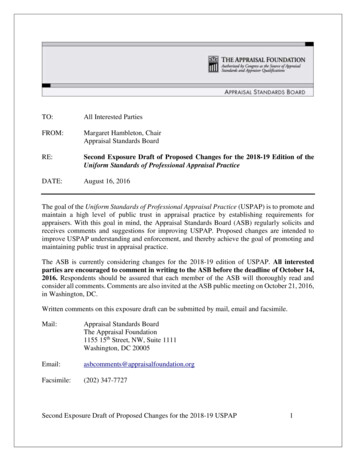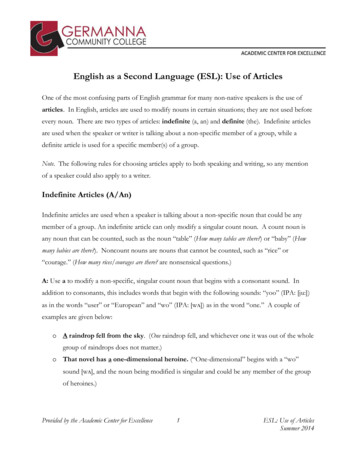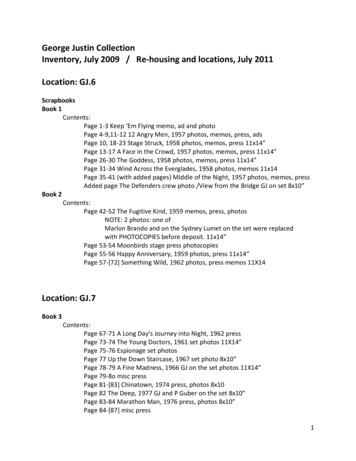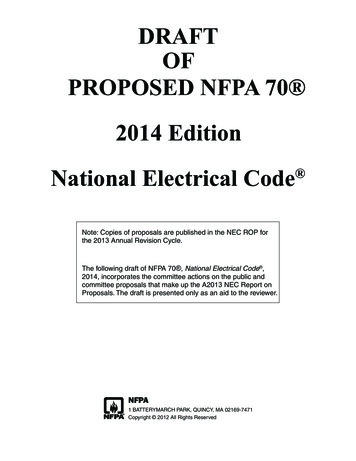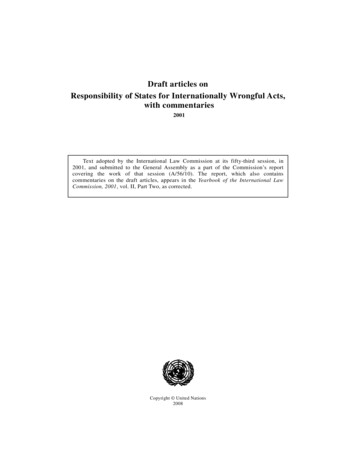
Transcription
Draft articles onResponsibility of States for Internationally Wrongful Acts,with commentaries2001Text adopted by the International Law Commission at its fifty-third session, in2001, and submitted to the General Assembly as a part of the Commission’s reportcovering the work of that session (A/56/10). The report, which also containscommentaries on the draft articles, appears in the Yearbook of the International LawCommission, 2001, vol. II, Part Two, as corrected.Copyright United Nations2008
State responsibilityRESPONSIBILITY OF STATES FORINTERNATIONALLY WRONGFUL ACTSGeneral commentary(1) These articles seek to formulate, by way of codification and progressive development, the basic rules ofinternational law concerning the responsibility of Statesfor their internationally wrongful acts. The emphasis ison the secondary rules of State responsibility: that is tosay, the general conditions under international law for theState to be considered responsible for wrongful actions oromissions, and the legal consequences which flow therefrom. The articles do not attempt to define the content ofthe international obligations, the breach of which givesrise to responsibility. This is the function of the primaryrules, whose codification would involve restating most ofsubstantive customary and conventional internationallaw.(2) Roberto Ago, who was responsible for establishingthe basic structure and orientation of the project, saw thearticles as specifying:the principles which govern the responsibility of States for internationally wrongful acts, maintaining a strict distinction between this taskand the task of defining the rules that place obligations on States, theviolation of which may generate responsibility [I]t is one thing todefine a rule and the content of the obligation it imposes, and anotherto determine whether that obligation has been violated and what shouldbe the consequences of the violation.32(3) Given the existence of a primary rule establishingan obligation under international law for a State, and assuming that a question has arisen as to whether that Statehas complied with the obligation, a number of furtherissues of a general character arise. These include:(a) The role of international law as distinct from theinternal law of the State concerned in characterizingconduct as unlawful;(b) Determining in what circumstances conduct isto be attributed to the State as a subject of internationallaw;(c) Specifying when and for what period of time thereis or has been a breach of an international obligation bya State;(d) Determining in what circumstances a State may beresponsible for the conduct of another State which is incompatible with an international obligation of the latter;(e) Defining the circumstances in which the wrongfulness of conduct under international law may be precluded;(f) Specifying the content of State responsibility, i.e.the new legal relations that arise from the commissionby a State of an internationally wrongful act, in terms ofcessation of the wrongful act, and reparation for anyinjury done;(g) Determining any procedural or substantive preconditions for one State to invoke the responsibility of32 Yearbook . 1970, vol. II, p. 306, document A/8010/Rev.l,para. 66 (c).31another State, and the circumstances in which the right toinvoke responsibility may be lost;(h) Laying down the conditions under which a Statemay be entitled to respond to a breach of an internationalobligation by taking countermeasures designed to ensurethe fulfilment of the obligations of the responsible Stateunder these articles.This is the province of the secondary rules of Stateresponsibility.(4) A number of matters do not fall within the scope ofState responsibility as dealt with in the present articles:(a) As already noted, it is not the function of the articles to specify the content of the obligations laid down byparticular primary rules, or their interpretation. Nor do thearticles deal with the question whether and for how longparticular primary obligations are in force for a State. Itis a matter for the law of treaties to determine whether aState is a party to a valid treaty, whether the treaty is inforce for that State and with respect to which provisions,and how the treaty is to be interpreted. The same is true,mutatis mutandis, for other “sources” of international obligations, such as customary international law. The articles take the existence and content of the primary rulesof international law as they are at the relevant time; theyprovide the framework for determining whether the consequent obligations of each State have been breached, andwith what legal consequences for other States.(b) The consequences dealt with in the articles arethose which flow from the commission of an internationally wrongful act as such.33 No attempt is made to dealwith the consequences of a breach for the continued validity or binding effect of the primary rule (e.g. the right ofan injured State to terminate or suspend a treaty for material breach, as reflected in article 60 of the 1969 ViennaConvention). Nor do the articles cover such indirect oradditional consequences as may flow from the responsesof international organizations to wrongful conduct. In carrying out their functions it may be necessary for international organizations to take a position on whether a Statehas breached an international obligation. But even wherethis is so, the consequences will be those determined byor within the framework of the constituent instrument ofthe organization, and these fall outside the scope of thearticles. This is particularly the case with action of theUnited Nations under the Charter, which is specificallyreserved by article 59.(c) The articles deal only with the responsibility forconduct which is internationally wrongful. There may becases where States incur obligations to compensate for theinjurious consequences of conduct which is not prohibited,and may even be expressly permitted, by international law(e.g. compensation for property duly taken for a publicpurpose). There may also be cases where a State is obligedto restore the status quo ante after some lawful activityhas been completed. These requirements of compensationor restoration would involve primary obligations; it wouldbe the failure to pay compensation, or to restore the status33 For the purposes of the articles, the term “internationally wrongful act” includes an omission and extends to conduct consisting ofseveral actions or omissions which together amount to an internationally wrongful act. See paragraph (1) of the commentary to article 1.
32Report of the International Law Commission on the work of its fifty-third sessionquo which would engage the international responsibilityof the State concerned. Thus for the purposes of thesearticles, international responsibility results exclusivelyfrom a wrongful act contrary to international law. This isreflected in the title of the articles.(d) The articles are concerned only with the responsibility of States for internationally wrongful conduct, leaving to one side issues of the responsibility of internationalorganizations or of other non-State entities (see articles57 and 58).Chapter IGENERAL PRINCIPLESArticle 1. Responsibility of a State for itsinternationally wrongful actsEvery internationally wrongful act of a State entailsthe international responsibility of that State.Commentary(5) On the other hand, the present articles are concernedwith the whole field of State responsibility. Thus they arenot limited to breaches of obligations of a bilateral character, e.g. under a bilateral treaty with another State. Theyapply to the whole field of the international obligationsof States, whether the obligation is owed to one or severalStates, to an individual or group, or to the internationalcommunity as a whole. Being general in character, theyare also for the most part residual. In principle, States arefree, when establishing or agreeing to be bound by a rule,to specify that its breach shall entail only particular consequences and thereby to exclude the ordinary rules ofresponsibility. This is made clear by article 55.(1) Article 1 states the basic principle underlying thearticles as a whole, which is that a breach of international law by a State entails its international responsibility.An internationally wrongful act of a State may consistin one or more actions or omissions or a combination ofboth. Whether there has been an internationally wrongfulact depends, first, on the requirements of the obligationwhich is said to have been breached and, secondly, on theframework conditions for such an act, which are set out inPart One. The term “international responsibility” coversthe new legal relations which arise under international lawby reason of the internationally wrongful act of a State.The content of these new legal relations is specified inPart Two.(6) The present articles are divided into four parts. PartOne is entitled “The internationally wrongful act of aState”. It deals with the requirements for the internationalresponsibility of a State to arise. Part Two, “Content ofthe international responsibility of a State”, deals with thelegal consequences for the responsible State of its internationally wrongful act, in particular as they concern cessation and reparation. Part Three is entitled “The implementation of the international responsibility of a State”.It identifies the State or States which may react to aninternationally wrongful act and specifies the modalitiesby which this may be done, including, in certain circumstances, by the taking of countermeasures as necessary toensure cessation of the wrongful act and reparation for itsconsequences. Part Four contains certain general provisions applicable to the articles as a whole.(2) PCIJ applied the principle set out in article 1 in anumber of cases. For example, in the Phosphates in Morocco case, PCIJ affirmed that when a State commits aninternationally wrongful act against another State international responsibility is established “immediately as between the two States”.34 ICJ has applied the principle onseveral occasions, for example in the Corfu Channel case,35in the Military and Paramilitary Activities in and againstNicaragua case,36 and in the Gabčíkovo-NagymarosProject case.37 The Court also referred to the principlein its advisory opinions on Reparation for Injuries,38 andon the Interpretation of Peace Treaties (Second Phase),39in which it stated that “refusal to fulfil a treaty obligationinvolves international responsibility”.40 Arbitral tribunalshave repeatedly affirmed the principle, for example in theClaims of Italian Nationals Resident in Peru cases,41 inPart OneTHE INTERNATIONALLY WRONGFULACT OF A STATEPart One defines the general conditions necessary forState responsibility to arise. Chapter I lays down three basic principles for responsibility from which the articlesas a whole proceed. Chapter II defines the conditionsunder which conduct is attributable to the State. ChapterIII spells out in general terms the conditions under whichsuch conduct amounts to a breach of an international obligation of the State concerned. Chapter IV deals with certain exceptional cases where one State may be responsiblefor the conduct of another State not in conformity with aninternational obligation of the latter. Chapter V definesthe circumstances precluding the wrongfulness for conduct not in conformity with the international obligationsof a State.34 Phosphates in Morocco, Judgment, 1938, P.C.I.J., Series A/B,No. 74, p. 10, at p. 28. See also S.S. “Wimbledon”, 1923, P.C.I.J.,Series A, No. 1, p. 15, at p. 30; Factory at Chorzów, Jurisdiction, Judgment No. 8, 1927, P.C.I.J., Series A, No. 9, p. 21; and ibid., Merits,Judgment No. 13, 1928, P.C.I.J., Series A, No. 17, p. 29.35 Corfu Channel, Merits, Judgment, I.C.J. Reports 1949, p. 4, atp. 23.36 Military and Paramilitary Activities in and against Nicaragua(Nicaragua v. United States of America), Merits, Judgment, I.C.J.Reports 1986, p. 14, at p. 142, para. 283, and p. 149, para. 292.37 Gabčíkovo-Nagymaros Project (see footnote 27 above), at p. 38,para. 47.38 Reparation for Injuries Suffered in the Service of the UnitedNations, Advisory Opinion, I.C.J. Reports 1949, p. 174, at p. 184.39 Interpretation of Peace Treaties with Bulgaria, Hungary andRomania, Second Phase, Advisory Opinion, I.C.J. Reports 1950,p. 221.40 Ibid., p. 228.41 Seven of these awards rendered in 1901 reiterated that “a universally recognized principle of international law states that the Stateis responsible for the violations of the law of nations committed by itsagents” (UNRIAA, vol. XV (Sales No. 66.V.3), pp. 399 (Chiessa claim),401 (Sessarego claim), 404 (Sanguinetti claim), 407 (Vercelli claim),408 (Queirolo claim), 409 (Roggero claim), and 411 (Miglia claim)).
State responsibility33the Dickson Car Wheel Company case,42 in the International Fisheries Company case,43 in the British Claims inthe Spanish Zone of Morocco case44 and in the ArmstrongCork Company case.45 In the “Rainbow Warrior” case,46the arbitral tribunal stressed that “any violation by a Stateof any obligation, of whatever origin, gives rise to Stateresponsibility”.47ary, a way by which the responsible State could avoidthe application of coercion. A third view, which came toprevail, held that the consequences of an internationallywrongful act cannot be limited either to reparation or toa “sanction”.51 In international law, as in any system oflaw, the wrongful act may give rise to various types oflegal relations, depending on the circumstances.(3) That every internationally wrongful act of a Stateentails the international responsibility of that State, andthus gives rise to new international legal relations additional to those which existed before the act took place,has been widely recognized, both before48 and since49 article 1 was first formulated by the Commission. It istrue that there were early differences of opinion over thedefinition of the legal relationships arising from an internationally wrongful act. One approach, associated withAnzilotti, described the legal consequences deriving froman internationally wrongful act exclusively in terms of abinding bilateral relationship thereby established betweenthe wrongdoing State and the injured State, in which theobligation of the former State to make reparation is setagainst the “subjective” right of the latter State to requirereparation. Another view, associated with Kelsen, startedfrom the idea that the legal order is a coercive order andsaw the authorization accorded to the injured State to apply a coercive sanction against the responsible State asthe primary legal consequence flowing directly from thewrongful act.50 According to this view, general international law empowered the injured State to react to a wrong;the obligation to make reparation was treated as subsidi-(4) Opinions have also differed on the question whetherthe legal relations arising from the occurrence of an internationally wrongful act were essentially bilateral, i.e.concerned only the relations of the responsible State andthe injured State inter se. Increasingly it has been recognized that some wrongful acts engage the responsibilityof the State concerned towards several or many States oreven towards the international community as a whole. Asignificant step in this direction was taken by ICJ in theBarcelona Traction case when it noted that:42 Dickson Car Wheel Company (U.S.A.) v. United Mexican States,UNRIAA, vol. IV (Sales No. 1951.V.1), p. 669, at p. 678 (1931).43 International Fisheries Company (U.S.A.) v. United MexicanStates, ibid., p. 691, at p. 701 (1931).44 According to the arbitrator, Max Huber, it is an indisputable principle that “responsibility is the necessary corollary of rights. All international rights entail international responsibility”, UNRIAA, vol. II(Sales No. 1949.V.1), p. 615, at p. 641 (1925).45 According to the Italian-United States Conciliation Commission,no State may “escape the responsibility arising out of the exercise ofan illicit action from the viewpoint of the general principles of international law”, UNRIAA, vol. XIV (Sales No. 65.V.4), p. 159, at p. 163(1953).46 Case concerning the difference between New Zealand andFrance concerning the interpretation or application of two agreementsconcluded on 9 July 1986 between the two States and which relatedto the problems arising from the Rainbow Warrior affair, UNRIAA,vol. XX (Sales No. E/F.93.V.3), p. 215 (1990).47 Ibid., p. 251, para. 75.48 See, e.g., D. Anzilotti, Corso di diritto internazionale, 4th ed.(Padua, CEDAM, 1955) vol. I, p. 385; W. Wengler, Völkerrecht (Berlin,Springer, 1964), vol. I, p. 499; G. I. Tunkin, Teoria mezhdunarodnogoprava (Moscow, Mezhdunarodnye otnoshenia, 1970), p. 470, trans. W.E. Butler, Theory of International Law (London, George Allen andUnwin, 1974), p. 415; and E. Jiménez de Aréchaga, “Internationalresponsibility”, Manual of Public International Law, M. Sørensen,ed. (London, Macmillan, 1968), p. 533.49 See, e.g., I. Brownlie, Principles of Public International Law,5th ed. (Oxford University Press, 1998), p. 435; B. Conforti, Dirittointernazionale, 4th ed. (Milan, Editoriale Scientifica, 1995), p. 332;P. Daillier and A. Pellet, Droit international public (Nguyen QuocDinh), 6th ed. (Paris, Librairie générale de droit et de jurisprudence,1999), p. 742; P.-M. Dupuy, Droit international public, 4th ed. (Paris,Dalloz, 1998), p. 414; and R. Wolfrum, “Internationally wrongful acts”,Encyclopedia of Public International Law, R. Bernhardt, ed. (Amsterdam, North-Holland, 1995), vol. II, p. 1398.50 See H. Kelsen, Principles of International Law, 2nd ed., R. W.Tucker, ed. (New York, Holt, Rinehart and Winston, 1966), p. 22.an essential distinction should be drawn between the obligations of aState towards the international community as a whole, and those arisingvis-à-vis another State in the field of diplomatic protection. By theirvery nature the former are the concern of all States. In view of theimportance of the rights involved, all States can be held to have a legalinterest in their protection; they are obligations erga omnes.52Every State, by virtue of its membership in the international community, has a legal interest in the protection ofcertain basic rights and the fulfilment of certain essentialobligations. Among these the Court instanced “the outlawing of acts of aggression, and of genocide, as also theprinciples and rules concerning the basic rights of the human person, including protection from slavery and racialdiscrimination”.53 In later cases the Court has reaffirmedthis idea.54 The consequences of a broader conception ofinternational responsibility must necessarily be reflectedin the articles which, although they include standard bilateral situations of responsibility, are not limited to them.(5) Thus the term “international responsibility” in article 1 covers the relations which arise under international law from the internationally wrongful act of a State,whether such relations are limited to the wrongdoing Stateand one injured State or whether they extend also to otherStates or indeed to other subjects of international law, andwhether they are centred on obligations of restitution orcompensation or also give the injured State the possibilityof responding by way of countermeasures.(6) The fact that under article 1 every internationallywrongful act of a State entails the international responsibility of that State does not mean that other States maynot also be held responsible for the conduct in question,or for injury caused as a result. Under chapter II the same51 See, e.g., R. Ago, “Le délit international”, Recueil des cours.,1939–II (Paris, Sirey, 1947), vol. 68, p. 415, at pp. 430–440;and L. Oppenheim, International Law: A Treatise, vol. I, Peace, 8thed., H. Lauterpacht, ed. (London, Longmans, Green and Co., 1955),pp. 352–354.52 Barcelona Traction (see footnote 25 above), p. 32, para. 33.53 Ibid., para. 34.54 See East Timor (Portugal v. Australia), Judgment, I.C.J. Reports1995, p. 90, at p. 102, para. 29; Legality of the Threat or Use of Nuclear Weapons, Advisory Opinion, I.C.J. Reports 1996, p. 226, at p. 258,para. 83; and Application of the Convention on the Prevention and Punishment of the Crime of Genocide, Preliminary Objections, Judgment,I.C.J. Reports 1996, p. 595, at pp. 615–616, paras. 31–32.
34Report of the International Law Commission on the work of its fifty-third sessionconduct may be attributable to several States at the sametime. Under chapter IV, one State may be responsible forthe internationally wrongful act of another, for exampleif the act was carried out under its direction and control.Nonetheless the basic principle of international law is thateach State is responsible for its own conduct in respect ofits own international obligations.ful act of the State, i.e. the constituent elements of suchan act. Two elements are identified. First, the conduct inquestion must be attributable to the State under international law. Secondly, for responsibility to attach to the actof the State, the conduct must constitute a breach of aninternational legal obligation in force for that State at thattime.(7) The articles deal only with the responsibility ofStates. Of course, as ICJ affirmed in the Reparation forInjuries case, the United Nations “is a subject of international law and capable of possessing internationalrights and duties it has capacity to maintain its rightsby bringing international claims”.55 The Court has alsodrawn attention to the responsibility of the United Nationsfor the conduct of its organs or agents.56 It may be that thenotion of responsibility for wrongful conduct is a basic element in the possession of international legal personality.Nonetheless, special considerations apply to the responsibility of other international legal persons, and these arenot covered in the articles.57(2) These two elements were specified, for example,by PCIJ in the Phosphates in Morocco case. The Courtexplicitly linked the creation of international responsibility with the existence of an “act being attributable to theState and described as contrary to the treaty right[s] ofanother State”.58 ICJ has also referred to the two elementson several occasions. In the United States Diplomatic andConsular Staff in Tehran case, it pointed out that, in orderto establish the responsibility of the Islamic Republic ofIran:(8) As to terminology, the French term fait internationalement illicite is preferable to délit or other similarexpressions which may have a special meaning in internal law. For the same reason, it is best to avoid, in English, such terms as “tort”, “delict” or “delinquency”, orin Spanish the term delito. The French term fait internationalement illicite is better than acte internationalementillicite, since wrongfulness often results from omissionswhich are hardly indicated by the term acte. Moreover, thelatter term appears to imply that the legal consequencesare intended by its author. For the same reasons, the termhecho internacionalmente ilícito is adopted in the Spanishtext. In the English text, it is necessary to maintain the expression “internationally wrongful act”, since the Frenchfait has no exact equivalent; nonetheless, the term “act” isintended to encompass omissions, and this is made clearin article 2.Article 2. Elements of an internationallywrongful act of a StateThere is an internationally wrongful act of a Statewhen conduct consisting of an action or omission:(a) is attributable to the State under internationallaw; and(b) constitutes a breach of an international obligation of the State.Commentary(1) Article 1 states the basic principle that every internationally wrongful act of a State entails its internationalresponsibility. Article 2 specifies the conditions requiredto establish the existence of an internationally wrong55Reparation for Injuries (see footnote 38 above), p. 179.Difference Relating to Immunity from Legal Process of a SpecialRapporteur of the Commission on Human Rights, Advisory Opinion,I.C.J. Reports 1999, p. 62, at pp. 88–89, para. 66.57 For the position of international organizations, see article 57 andcommentary.56[f]irst, it must determine how far, legally, the acts in question may beregarded as imputable to the Iranian State. Secondly, it must considertheir compatibility or incompatibility with the obligations of Iran undertreaties in force or under any other rules of international law that maybe applicable.59Similarly in the Dickson Car Wheel Company case, theMexico-United States General Claims Commission notedthat the condition required for a State to incur international responsibility is “that an unlawful international act beimputed to it, that is, that there exist a violation of a dutyimposed by an international juridical standard”.60(3) The element of attribution has sometimes beendescribed as “subjective” and the element of breach as“objective”, but the articles avoid such terminology.61Whether there has been a breach of a rule may dependon the intention or knowledge of relevant State organsor agents and in that sense may be “subjective”. For example, article II of the Convention on the Prevention andPunishment of the Crime of Genocide states that: “In thepresent Convention, genocide means any of the followingacts committed with intent to destroy, in whole or in part,a national, ethnical, racial or religious group, as such ”In other cases, the standard for breach of an obligationmay be “objective”, in the sense that the advertence orotherwise of relevant State organs or agents may be irrelevant. Whether responsibility is “objective” or “subjective” in this sense depends on the circumstances, including the content of the primary obligation in question. Thearticles lay down no general rule in that regard. The sameis true of other standards, whether they involve some degree of fault, culpability, negligence or want of due diligence. Such standards vary from one context to anotherfor reasons which essentially relate to the object andpurpose of the treaty provision or other rule giving riseto the primary obligation. Nor do the articles lay downany presumption in this regard as between the different58See footnote 34 above.United States Diplomatic and Consular Staff in Tehran, Judgment, I.C.J. Reports 1980, p. 3, at p. 29, para. 56. Cf. page 41,para. 90. See also Military and Paramilitary Activities in and againstNicaragua (footnote 36 above), pp. 117–118, para. 226; and GabčíkovoNagymaros Project (footnote 27 above), p. 54, para. 78.60 See footnote 42 above.61 Cf. Yearbook . 1973, vol. II, p. 179, document A/9010/Rev.1,paragraph (1) of the commentary to article 3.59
State responsibilitypossible standards. Establishing these is a matter for theinterpretation and application of the primary rules engaged in the given case.(4) Conduct attributable to the State can consist of actions or omissions. Cases in which the internationalresponsibility of a State has been invoked on the basis ofan omission are at least as numerous as those based onpositive acts, and no difference in principle exists betweenthe two. Moreover, it may be difficult to isolate an “omission” from the surrounding circumstances which are relevant to the determination of responsibility. For example,in the Corfu Channel case, ICJ held that it was a sufficientbasis for Albanian responsibility that it knew, or must haveknown, of the presence of the mines in its territorial watersand did nothing to warn third States of their presence.62In the United States Diplomatic and Consular Staff inTehran case, the Court concluded that the responsibilityof the Islamic Republic of Iran was entailed by the “inaction” of its authorities which “failed to take appropriatesteps”, in circumstances where such steps were evidentlycalled for.63 In other cases it may be the combination ofan action and an omission which is the basis for responsibility.64(5) For particular conduct to be characterized as an internationally wrongful act, it must first be attributableto the State. The State is a real organized entity, a legalperson with full authority to act under international law.But to recognize this is not to deny the elementary factthat the State cannot act of itself. An “act of the State”must involve some action or omission by a human beingor group: “States can act only by and through their agentsand representatives.”65 The question is which personsshould be considered as acting on behalf of the State, i.e.what constitutes an “act of the State” for the purposes ofState responsibility.(6) In speaking of attribution to the State what is meantis the State as a subject of international law. Under manylegal systems, the State organs consist of different legalpersons (ministries or other legal entities), which are regarded as having distinct rights and obligations for whichthey alone can be sued and are responsible. For the purposes of the international law of State responsibilitythe position is different. The State is treated as a unity,consistent with its recognition as a single legal person ininternational law. In this as in other respects the attribution of conduct to the State is necessarily a normative operation. What is crucial is that a given event is sufficiently62Corfu Channel, Merits (see footnote 35 above), pp. 22–23.United States Diplomatic and Consular Staff in Tehran (seefootnote 59 above), pp. 31–32, paras. 63 and 67. See also VelásquezRodríguez v. Honduras case, Inter-American Court of Human Rights,Series C, No. 4, para. 170 (1988): “under international law a State isresponsible for the acts of its agents undertaken in their official capacity and for their omissions”; and Affaire relative à l’acquisition de lanationalité polonaise, UNRIAA, vol. I (Sales No. 1948.V.2), p. 401, atp. 425 (1924).64 For example, under article 4 of the Convention relative to theLayi
part One the internatiOnally wrOngful aCt Of a state Part One defines the general conditions necessary for State responsibility to arise. Chapter I lays down three ba-sic principles for responsibility from which the articles as a whole proceed. Chapter II defines the conditions under which conduct is attributable to the State. Chapter

